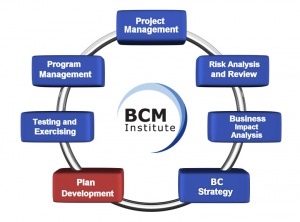Damage Assessment
| 1. Damage Assessment or DA is the process of assessing the financial and non-financial damage after a disruption has occurred.
Note: This assessment includes damage to physical assets, for example facilities, vital records and equipment, to determine what can be salvaged or restored and what must be replaced.  Implementing Your Business Continuity Plan BUY!
Guidance Notes and Templates
| |||||||||||||||||||||||||||||
2. The process of assessing the financial/non-financial damage following a Business Continuity E/I/C. It usually refers to the assessment of damage to physical assets e.g. vital records, buildings, sites, technology to determine what can be salvaged or restored and what must be replaced.
(Source: Business Continuity Institute - BCI)
3. The process used to appraise or determine the number of injuries and human loss, damage to public and private property, and the status of key facilities and services resulting from a natural or human-caused disaster or emergency.
(Source: ASIS International - ASIS International)
4. An appraisal or determination of the effects of disaster on human,physical,economic and natural resources.
(Source: NFPA 1600 Standard on Disaster/Emergency Management and Business Continuity Programs, NFPA 1600:2007)
5. The process of evaluating the severity and consequences of an incident and communicating the results.
(Source: NFPA 1600 Standard on Disaster/Emergency Management and Business Continuity Programs, NFPA 1600:2007)


